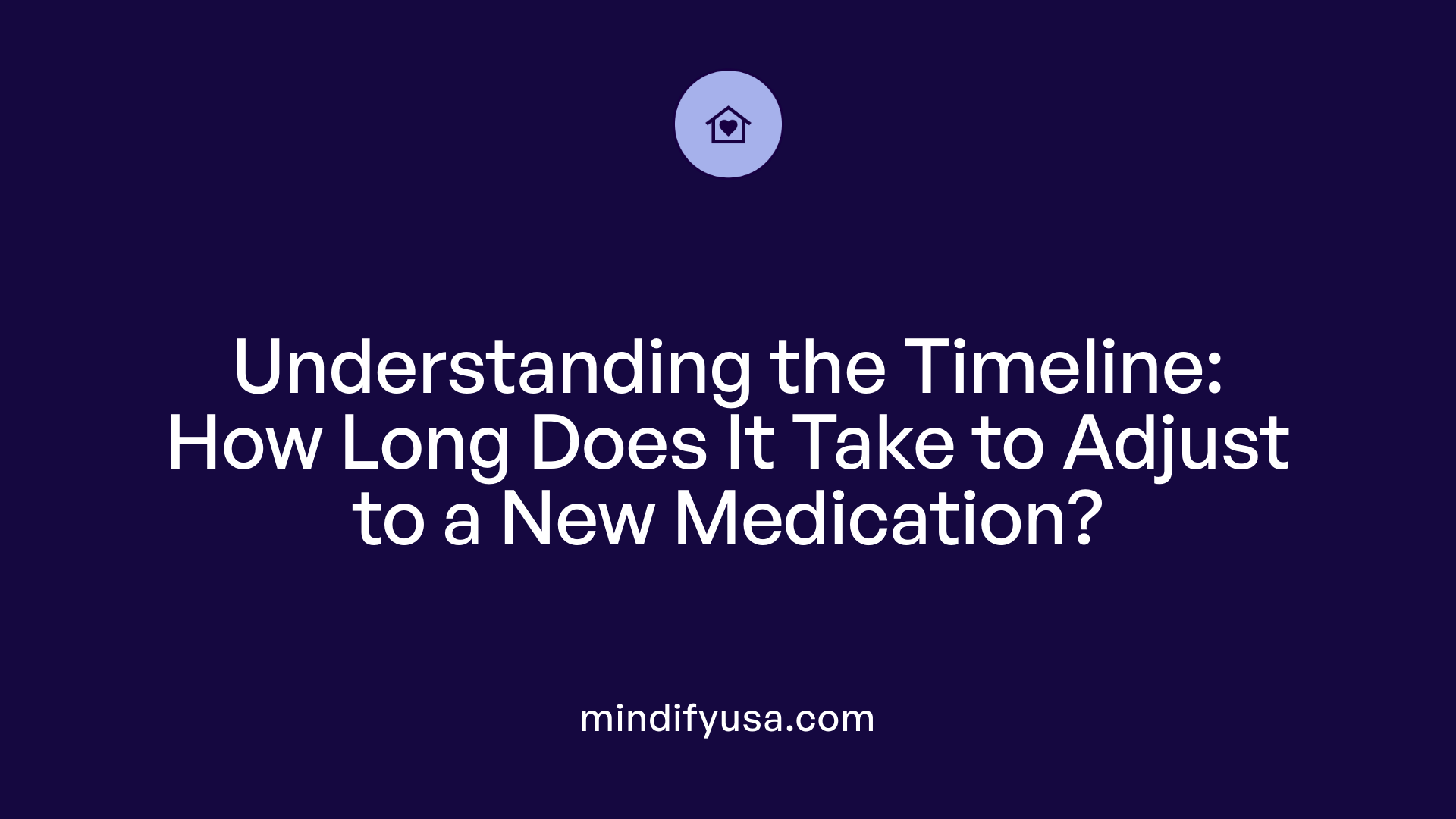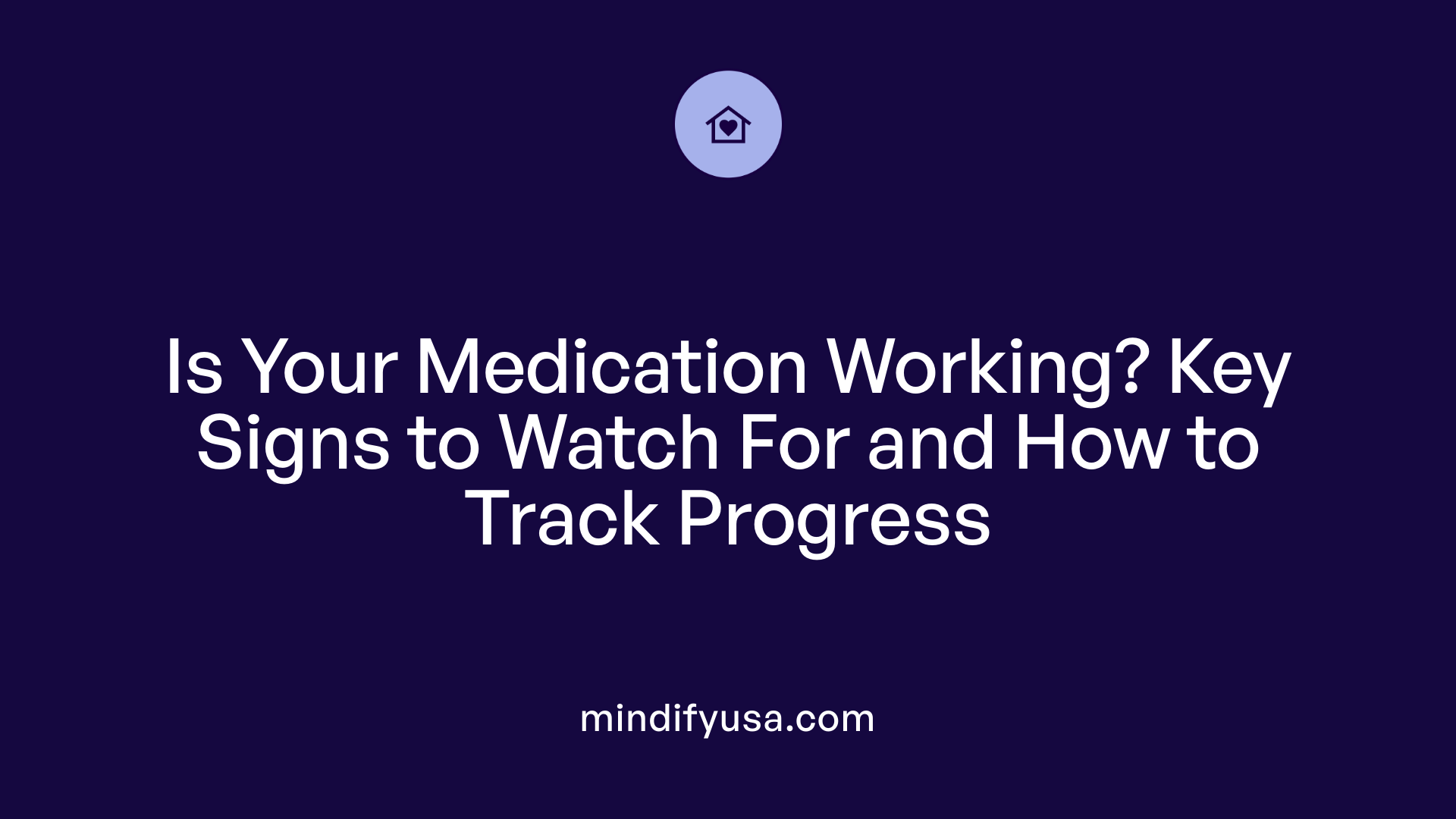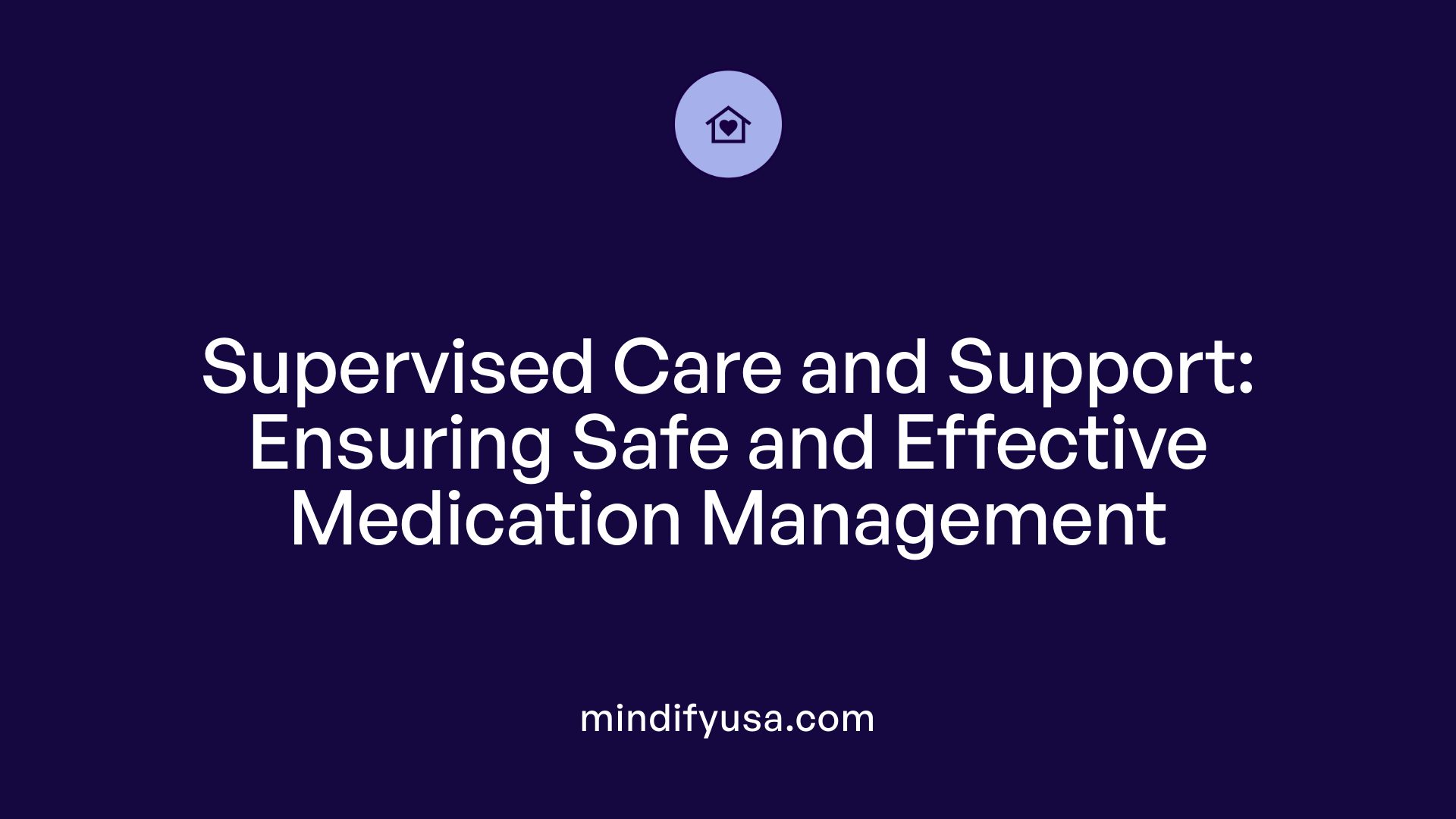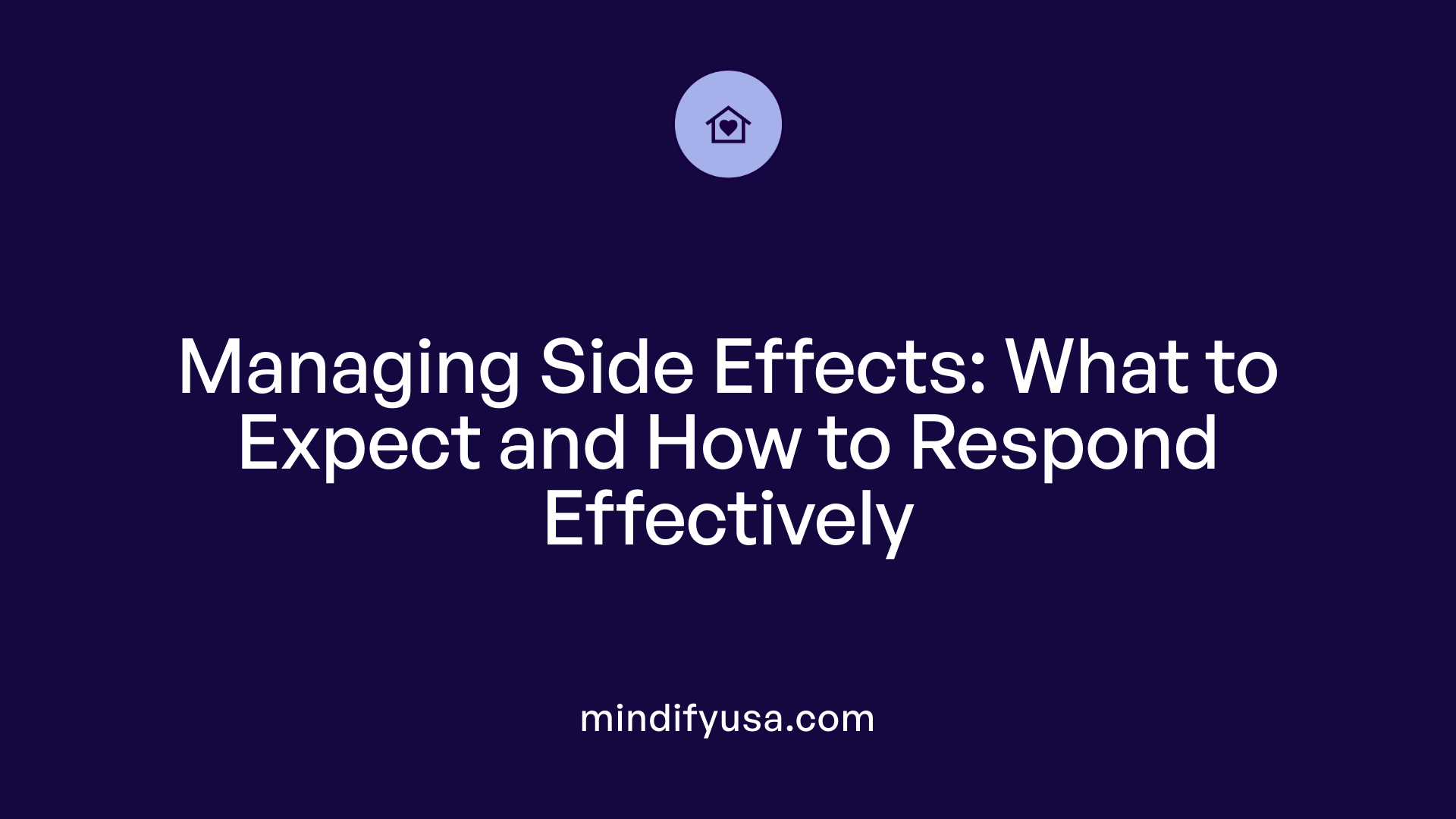Understanding What Comes After Your Medication Change
Adjusting to new or modified medications is a crucial step in managing mental health conditions effectively. This process involves careful monitoring, communication with healthcare providers, and patience as your body and mind adapt to changes. Knowing what to expect can ease anxiety, promote engagement with your treatment plan, and support better outcomes.
The Stages of Medication Adjustment and What They Imply

How long does it typically take to adjust to a new medication?
Adjusting to a new medication usually begins within one to two weeks, as the brain starts to adapt to changes in chemical levels. However, the full adjustment can take longer, often between four to eight weeks. During this period, healthcare providers closely monitor side effects and the medication’s effectiveness.
Various factors influence the adjustment timeline, including the type of medication prescribed and individual differences in brain chemistry or medical history. For example, antidepressants or anti-anxiety medications may require several weeks before reaching their maximum effect. Patients are encouraged to stay in regular contact with their psychiatrist to facilitate safe and effective medication management.
Patience is vital because some side effects may diminish over time, whereas others may signal the need for dosage adjustments. Overall, navigating this adjustment period requires ongoing communication with healthcare providers to ensure the medication provides the intended benefits without undue side effects.
Monitoring Progress and Recognizing Signs of Effectiveness

How can I tell if my medication change is working?
Monitoring how you feel and how your symptoms change is vital when you start or adjust a medication. In the case of mental health treatments, improvements might include feeling less anxious or depressed, having better sleep, or experiencing fewer episodes of mood swings. It’s helpful to keep a journal or notes on your daily feelings, energy levels, and any side effects.
Many medications, especially antidepressants, can take about 4 to 8 weeks to reach their full effect. During this time, patience and consistent communication with your psychiatrist are important. Regular follow-up appointments allow your healthcare provider to evaluate your progress, review your notes, and decide if dosages need adjusting.
Additionally, observe for any persistent or new side effects such as nausea, dizziness, or emotional numbness. Noticing when symptoms lessen or stabilize, and side effects diminish, are signs that your medication is working.
Here’s a simple table summarizing signs to watch for:
| Signs of Effective Medication | What to Look For | Additional Notes |
|---|---|---|
| Symptom alleviation | Reduced mood swings, less anxiety, better mood | Improvement varies per individual |
| Fewer side effects | Decrease in nausea, headaches, sexual dysfunction | Some side effects may persist temporarily |
| Increased ability to function | Better sleep, energy, social activities | Functional improvements reflect effectiveness |
Remember, every person responds differently, so close monitoring and communication are crucial.
What should I do if I notice my symptoms aren't improving or worsen?
If after several weeks you notice no improvement or your symptoms worsen, it’s important to contact your healthcare provider promptly. Worsening symptoms could mean that the medication isn’t effective, or there might be other factors involved.
Common signs that need attention include:
- Persistent or worsening depression or anxiety
- The emergence of new or intense side effects
- Feelings of emotional numbness or flatness
- Sleep disturbances or appetite changes
- Suicidal thoughts or self-harm urges
Keep a detailed record of your symptoms and side effects, including when they occur and their severity. This information helps your psychiatrist assess whether your current medication regimen needs adjustment.
Adjustments might involve changing the dose, trying a different medication, or combining treatments like therapy. Never adjust medication on your own, as improper changes can cause withdrawal symptoms or other risks.
During this process, regular follow-ups are essential to ensure your treatment remains safe and effective. Maintaining open and honest communication with your healthcare provider makes a significant difference in your recovery journey.
The Role of Supervised Care and Ongoing Support

What happens during supervised care and ongoing support for medication management?
Supervised care for medication management involves a healthcare team, typically comprised of psychiatrists, nurses, and pharmacists, overseeing both direct and indirect activities related to treatment. Direct activities include administering medications, measuring precise doses, and ensuring medications are taken at scheduled times. Indirect tasks involve organizing prescriptions, tracking medication adherence, and collecting information on the patient’s response and side effects.
To promote safety and accuracy, various tools are used. These include pillboxes labeled for specific days or times, medication lists, and reminder systems such as alarms or smartphone alerts. Digital technologies, like barcode verification and computerized order entry, further help ensure that the right medication is taken correctly.
Regular check-ins with healthcare providers are crucial. These appointments help monitor for adverse effects, assess the effectiveness of the medication, and determine whether adjustments are necessary. When adjustments are required, they are made cautiously under medical supervision to minimize risks such as withdrawal symptoms or worsening mental health issues.
Caregivers, nurses, and clinicians also play an active role in providing verbal reminders and reinforcing routines. They implement safety measures, such as double-checking doses and timing, to prevent errors. Overall, supervised care ensures that medications are used correctly, effectively, and safely, supporting the patient’s recovery process.
Why is ongoing support important for medication success?
Ongoing support is essential because it helps maintain continuous oversight of how a patient responds to their medication regimen. Regular follow-ups enable early detection of side effects and effectiveness, making timely adjustments possible. This ongoing communication fosters a strong partnership between patients and healthcare providers, which is vital for managing complex or long-term treatments.
Support from healthcare professionals also offers reassurance, reduces anxiety about medication effects, and enhances treatment adherence. Patients are better equipped with knowledge about proper medication storage, potential side effects, and interactions with other drugs or substances. This personalized guidance helps prevent complications, such as adverse reactions or overdose.
Furthermore, sustained support can accommodate life changes — like moving, divorce, or stressful events — which may impact mental health and require dosage modifications. It also encourages the use of complementary strategies such as therapy, lifestyle changes, and support groups. Ultimately, ongoing supervision improves overall outcomes by ensuring that treatment remains effective and safe over time.
Understanding Potential Side Effects and Supportive Management

What are potential side effects of medication, and how should I manage them?
Medications for mental health conditions can sometimes cause side effects, which vary from mild to severe. Mild side effects often include dry mouth, headaches, nausea, dizziness, or sexual dysfunction. These tend to improve as the body adjusts to the medication over time.
However, some side effects can be more serious and require immediate attention. For example, allergic reactions, severe rash, or signs of organ damage such as jaundice or chest pain are critical to recognize.
To manage side effects effectively, it is essential to maintain open communication with your healthcare provider. Report any bothersome symptoms as soon as they appear. Your doctor may adjust your dose, switch to a different medication, or suggest supportive treatments to alleviate discomfort.
Following your medication instructions carefully, including how and when to take your medication, helps minimize side effects. Keeping a journal of symptoms, side effects, and medication schedules can aid discussions with your healthcare provider.
Always prioritize your safety by being aware of serious adverse reactions. Signs like difficulty breathing, swelling, severe rash, or symptoms of an allergic reaction require immediate medical attention.
Remember, never stop or change your medication without consulting your healthcare professional. Regular reviews of your medication plan ensure it remains safe and effective for your specific needs.
What should I do if I experience severe or concerning side effects?
If you experience severe or alarming side effects such as difficulty breathing, swelling of the face or throat, severe rash, chest pain, hallucinations, or suicidal thoughts, seek emergency medical care immediately. These reactions can escalate quickly and pose significant health risks.
Contact your healthcare provider urgently or go to the nearest emergency room for evaluation and treatment. Prompt action in these situations can be life-saving.
While waiting for medical help, try to stay calm, note your symptoms, and inform the medical team about all medications you are taking. Providing detailed information can help healthcare providers assess and manage the situation effectively.
Monitoring your mental and physical health during medication treatment is crucial. Don't hesitate to seek help if you notice any new or worsening symptoms, especially if they feel severe or life-threatening.
In summary, awareness and prompt response to side effects—both minor and severe—are vital components of safe and effective mental health medication management.
Managing Expectations and Cultivating Patience
How can medication responses vary among individuals, and what should I do?
Responses to psychiatric medications can differ widely from person to person. These variations stem largely from genetic factors that influence how the body metabolizes and responds to drugs. Advances in pharmacogenetics and genomics have helped identify specific genetic markers that affect drug effectiveness and the likelihood of side effects, paving the way for more personalized treatments.
Aside from genetics, other influences include age, body size, overall health, other medications being taken, and lifestyle factors such as diet and adherence to prescribed routines. For example, someone with liver or kidney conditions might process medications differently, impacting their response.
Understanding these factors enables better management of treatment expectations. It emphasizes the importance of working closely with healthcare providers, who can suggest genetic testing or adjustments based on your unique profile. Adjusting medication doses or trying different medications under professional supervision can significantly improve outcomes and minimize adverse effects.
| Factors Influencing Medication Response | Impact | Additional Details |
|---|---|---|
| Genetics | Alters how drugs are metabolized & effectiveness | Pharmacogenetic testing can identify individual genetic differences |
| Age | Affects drug absorption & processing | Elderly may require lower doses due to slower metabolism |
| Concomitant Medications | Risk of interactions including adverse effects | Monitor for serotonin syndrome when combining serotonergic drugs |
| Lifestyle & Diet | Can influence drug levels & response | Some foods or beverages may interfere with medication efficacy |
In summary, personalized treatment planning and open communication with your healthcare provider are essential. This collaborative approach helps tailor medication choices to your needs and improves the chances of effective management.
How can I stay patient and positive during the adjustment process?
Waiting for medications to take effect can test patience, but maintaining a positive outlook is crucial. Most psychiatric medications, such as antidepressants or mood stabilizers, require several weeks—usually up to 8 weeks—to reach their full potential.
During this waiting period, regular follow-ups with your psychiatrist are vital. These appointments allow for monitoring your progress, discussing any side effects, and making necessary adjustments. Tracking your symptoms, mood, sleep patterns, and energy levels in a journal can provide valuable insights to share with your doctor.
Supporting your mental health with self-care strategies is equally important. Practices like mindfulness exercises, engaging in physical activity, maintaining healthy eating habits, and ensuring adequate sleep can bolster your overall well-being.
Understanding that some initial side effects—such as emotional numbness, mild nausea, or sleep disturbances—are temporary can help you stay resilient. Remember, adjustments often involve a bit of trial and error. Patience with the process, combined with proactive communication and self-care, can enhance your recovery journey.
For additional encouragement, consider joining support groups or connecting with others who are going through similar experiences. Sharing stories and coping strategies can foster a sense of hope and community.
Additional Resources
- Search term for more info: "patient patience medication adjustment"
- Recommended reading:
Supporting Your Medication Journey
Navigating medication adjustments is a dynamic process that requires patience, open communication, and active participation. Regular follow-up appointments, vigilant monitoring of symptoms and side effects, and collaboration with healthcare providers are essential to ensure safe and effective treatment. Remember that individual responses vary, and what works for one person might differ for another. Supported by ongoing care and education, you can empower yourself to manage your mental health proactively. Embrace the process as a step toward recovery and stability, knowing that adjustments and support are part of a tailored path to wellness.
References
- Supervised Medication Adjustment: What to Expect
- When to Consider Medication Adjustments: Signs It's Time ...
- Psychiatric Medication Management: What To Expect?
- What To Expect After A Medication Evaluation: Next Steps For ...
- What Adjustments to Expect from Depression Medication
- Signs You Might Need to Adjust Your Psychiatric Medication
- 6 top tips for adjusting to new medication
- Knowing When It's Time for a Medication Check-In





































































































